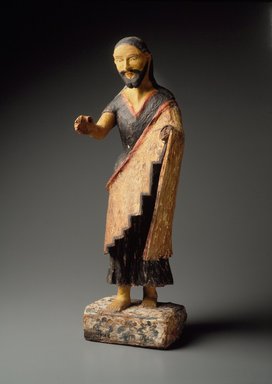Browse

| Accession # | 02.257.2425 |
|---|---|
| Culture | Zia Pueblo |
| Title | Carved Figure (Bulto) of Saint Joseph |
| Date | 19th century |
| Medium | Wood, cloth, gesso, paint |
| Dimensions | 25 1/4 x 7 1/2 x 5 1/4in. (64.1 x 19.1 x 13.3cm)) |
| Credit Line | Riggs Pueblo Pottery Fund |
| Location | Visible Storage: Case 34, Shelf D (Spanish Colonial Art) |
| Description | A polychrome figure (bulto) of Saint Joseph set on a thick wooden base in a frontal pose with one foot in front of the other. He is dressed in a black short-sleeve robe with a red V-neck collar. A yellow cape with a step-shaped border is draped diagonally over the figure's torso. The skin has a yellow pallor and the eyes are painted white with large black pupils. Three floral motifs are painted on the front of the base. Smaller three-pronged motifs embellish the top surface. There is overall gesso and paint loss on the piece and fabric can be seen under the gesso on the back and sides of the base and cape. The entire left forearm has been broken and is missing. |
Curatorial Remarks: This statue of Saint Joseph (his staff and the Christ Child are missing) reportedly comes from the church at Zia Pueblo, where it was likely displayed on a sanctuary table. The artist could have been Native American or of Mexican-Hispanic heritage.
Present-day New Mexico was the northernmost frontier of the Spanish colonial empire. Spanish missions were established there to convert the indigenous population to Catholicism. The remoteness of the region encouraged the development of religious folk images that differed greatly from the more elaborate devotional sculptures produced in Europe and the viceregal capital (modern Mexico City).